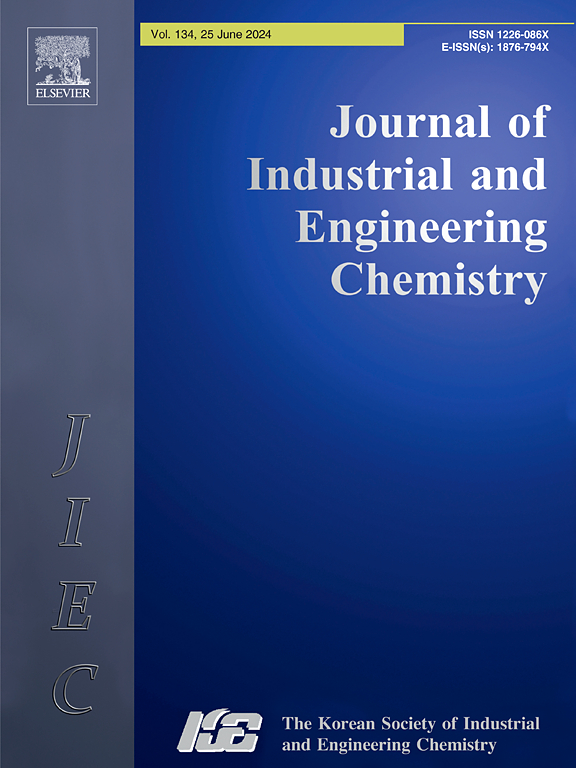The mechanism of citric acid and oxalic acid on dissolution of high-silicon iron tailings
IF 5.9
3区 工程技术
Q1 CHEMISTRY, MULTIDISCIPLINARY
Journal of Industrial and Engineering Chemistry
Pub Date : 2024-08-23
DOI:10.1016/j.jiec.2024.08.034
引用次数: 0
Abstract
In the indoor static environment, citric acid and oxalic acid, two kinds of low molecular weight organic acids were used to dissolve silicon and iron, which were two valuable elements in iron tailings. The results showed that the iron tailings used in this study were high silicon type iron tailings with 76.1 % silicon content and 11.31 % iron content. Both acids were soluble to ferrosilicon, but their solubility to iron was higher. Compared with the two, oxalic acid had stronger silicon solubility, reaching 35.98 μg/mL after 24d. The solubility of citric acid to iron was stronger, reaching 483.51 μg/mL after 24d. The dissolution of silicon and total iron in iron tailings by oxalic acid, citric acid and mixed acid conforms to first-order kinetics and belongs to surface dissolution reaction. After the dissolution of oxalic acid, silicon and iron ions might exist in the form of metasilic acid, iron oxalate and trioxalate potassium ferrite. Oxalic acid reacted with Fe2+ to precipitate, which might be the reason for the higher Fe3+ in the solution. The silicon and iron ions after citric acid dissolution might exist in the form of ferric citrate, ferric citrate complex, ferrous hexafluorosilicate, and more Fe2+ products might be the reason for the higher Fe2+ in the solution.

柠檬酸和草酸对高硅铁尾矿溶解的作用机理
在室内静态环境中,使用柠檬酸和草酸这两种低分子量有机酸来溶解铁尾矿中的硅和铁这两种有价元素。结果表明,本研究使用的铁尾矿属于高硅型铁尾矿,含硅量为 76.1%,含铁量为 11.31%。两种酸都能溶解硅铁,但对铁的溶解度更高。两者相比,草酸对硅的溶解度更高,24d 后达到 35.98 μg/mL。柠檬酸对铁的溶解度更高,24 天后达到 483.51 μg/mL。草酸、柠檬酸和混合酸对铁尾矿中硅和总铁的溶解符合一阶动力学,属于表面溶解反应。草酸溶解后,硅和铁离子可能以偏硅酸、草酸铁和三草酸钾铁氧体的形式存在。草酸与铁反应生成沉淀,这可能是溶液中铁含量较高的原因。柠檬酸溶解后的硅和铁离子可能以柠檬酸铁、柠檬酸铁络合物、六氟硅酸亚铁的形式存在,更多的铁产物可能是溶液中铁含量较高的原因。
本文章由计算机程序翻译,如有差异,请以英文原文为准。
求助全文
约1分钟内获得全文
求助全文
来源期刊
CiteScore
10.40
自引率
6.60%
发文量
639
审稿时长
29 days
期刊介绍:
Journal of Industrial and Engineering Chemistry is published monthly in English by the Korean Society of Industrial and Engineering Chemistry. JIEC brings together multidisciplinary interests in one journal and is to disseminate information on all aspects of research and development in industrial and engineering chemistry. Contributions in the form of research articles, short communications, notes and reviews are considered for publication. The editors welcome original contributions that have not been and are not to be published elsewhere. Instruction to authors and a manuscript submissions form are printed at the end of each issue. Bulk reprints of individual articles can be ordered. This publication is partially supported by Korea Research Foundation and the Korean Federation of Science and Technology Societies.

 求助内容:
求助内容: 应助结果提醒方式:
应助结果提醒方式:


